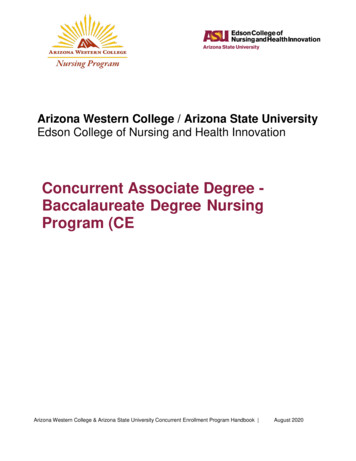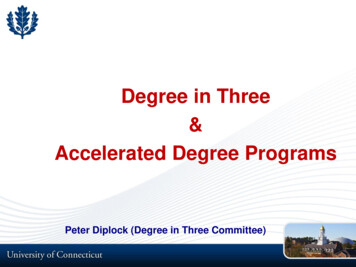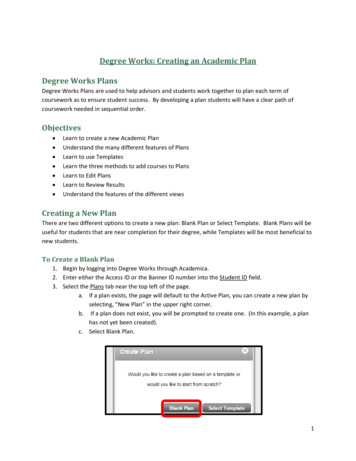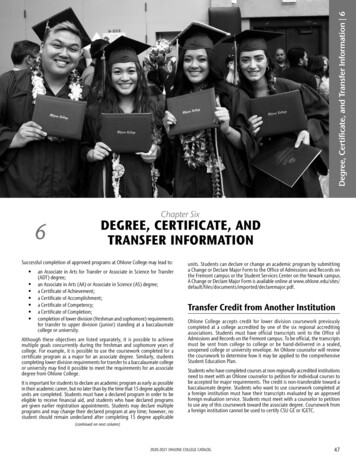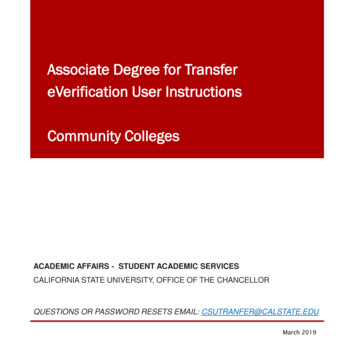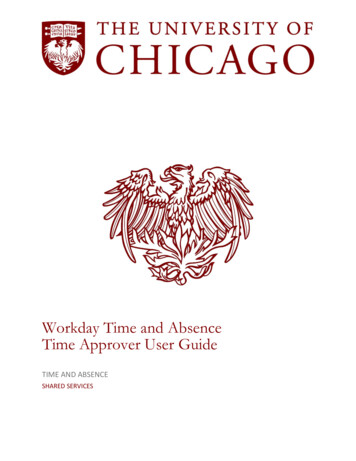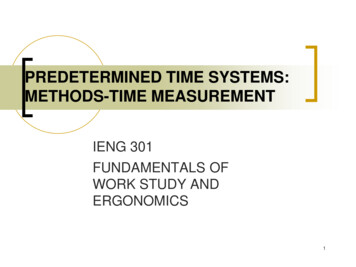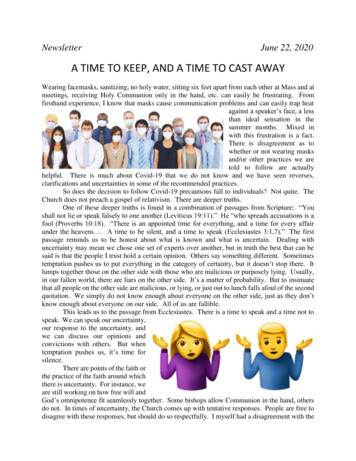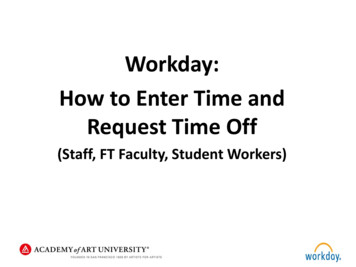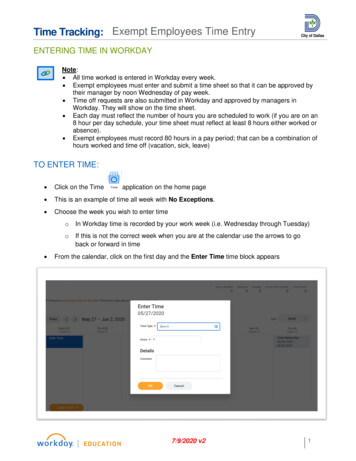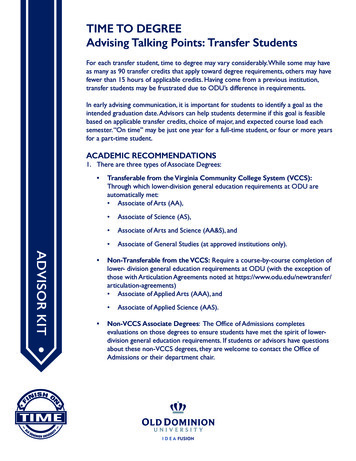
Transcription
TIME TO DEGREEAdvising Talking Points: Transfer StudentsTIME TO DEGREE: Advising Talking Points- Page 1For each transfer student, time to degree may vary considerably. While some may haveas many as 90 transfer credits that apply toward degree requirements, others may havefewer than 15 hours of applicable credits. Having come from a previous institution,transfer students may be frustrated due to ODU’s difference in requirements.In early advising communication, it is important for students to identify a goal as theintended graduation date. Advisors can help students determine if this goal is feasiblebased on applicable transfer credits, choice of major, and expected course load eachsemester. “On time” may be just one year for a full-time student, or four or more yearsfor a part-time student.ACADEMIC RECOMMENDATIONS1. There are three types of Associate Degrees: ADVISOR KIT Transferable from the Virginia Community College System (VCCS):Through which lower-division general education requirements at ODU areautomatically met: Associate of Arts (AA), Associate of Science (AS), Associate of Arts and Science (AA&S), and Associate of General Studies (at approved institutions only).Non-Transferable from the VCCS: Require a course-by-course completion oflower- division general education requirements at ODU (with the exception ofthose with Articulation Agreements noted at ments) Associate of Applied Arts (AAA), and Associate of Applied Science (AAS).Non-VCCS Associate Degrees: The Office of Admissions completesevaluations on those degrees to ensure students have met the spirit of lowerdivision general education requirements. If students or advisors have questionsabout these non-VCCS degrees, they are welcome to contact the Office ofAdmissions or their department chair.
TIME TO DEGREE: Advising Talking Points- Page 2TIME TO DEGREE: Advising Talking Points- Page 32. Questions advisors should ask all transfer students:6. Accessibility Issues: The Office of Educational Accessibility assists students andfaculty to develop appropriate accommodations for both temporary challenges(e.g. injuries, illness, recuperation from eye surgery) as well as for diagnoseddisabilities. Location: Student Success Center. Website: http://www.odu.edu/educationalaccessibility.Did the student complete a VCCS Associate degree? If so, what type: AA, AS,AA&S; or AAA, or AAS? If AA, AS, AA&S, does DegreeWorks indicate Lower Division GE Requirementscompleted? If not—OFTEN—advisors should verify orally whether studentshave completed or will complete a transferable degree and explain that lowerdivision general education requirements listed in DegreeWorks will likely bemet—with some program-specific exceptions—and therefore the studentsshould take NO lower division general education courses in spite of whatDegreeWorks shows.7. Refer students to Academic Support resources that will help them to be successful: If AAA or AAS, did the student complete an Articulation Agreement? If soor not—USUALLY—DegreeWorks will not indicate Lower Division GERequirements completed? To verify that the student has completed/operatedunder an Articulation Agreement, advisors can seek oral verification, inspectthe student record to see if substantial coursework matches the ArticulationAgreement requirements, and ask the student whether he/she recognizes theArticulation Agreement curriculum sheet and has been following it. Instructany likely articulation agreement student to take NO lower division generaleducation courses in spite of what DegreeWorks shows, and refer student tothe Transfer Advising Office.4. The most important strategy for finishing on time is to avoid drops, failures,withdrawals, or incomplete grades (D,F,W,I): The key to avoiding DFW or incomplete grades is for the student to use courseand university resources. When taking online or hybrid classes, students must recognize the importanceof self-motivation and communicating frequently with their professors.5. Study Time: Students should plan to study for 2–3 hours for every credit hour ofenrollment. For example, if a student is taking 15 credits, then he/she should bestudying 30–45 hours a week.ADVISOR KITADVISOR KIT3. Verify that final transcript from previously attended institution(s) has been submittedand is properly reflected in Leo Online. Tutoring Cumulative List of Campus Tutoring ecific Peer Educator Program http://odu.edu/peereducator Math & Science Resource Center http://sci.odu.edu/msrc/ (assistance withMath 101M, 102M, 103M, 162M, 163, 200; assistance with CHEM 105N/106N,107N/108N, 121N/122N, 123N/124N) Language Learning Center http://al.odu.edu/llc/ Math Lab (assistance with math courses not supported by MSRC) http://sci.odu.edu/math/academics/lab.shtml “Smart Thinking” on-line tutoring, ne, free online tutoring available 24-7 via Blackboard The Writing Center http://al.odu.edu/writingcenter/, free individual tutorialsto undergraduates and graduates working on writing projects for any course Student Support Services: see website for eligibility criteria. Location: 2016Student Success Center. Website: http://uc.odu.edu/sss/ Student Success Center http://ww2.odu.edu/ao/successcenter/ Physics Learning Center terMentoring & Academic Coaching Academic Coaching and Success Workshops: http://www.odu.edu/success/academic/coaching Monarch 2 Monarch ommunity-service/monarch-2-monarch
TIME TO DEGREE: Advising Talking Points- Page 4 TIME TO DEGREE: Advising Talking Points- Page 5MAJOR EXPLORATIONTransfer Student Success Courses and Opportunities Recommend UNIV 112: “Transfer Seminar.” This seminar provides resources andopportunities for students to build relationships with other transfer students andfaculty and to explore individual strengths, values, skills, and interests. Encourage students to attend “Transfer Student Day” during Week of Welcome. Encourage students with GPA above 3.5 to contact the Tau Sigma Honors Society.1. Encourage students to use sample degree plans for their majors where courses arespread out over four years and transfer information is listed. Transfer sample degreeplans can be found online: heets/2014-2015-transfer.Online Resources Khan Academy http://www.khanacademy.org. Provides math/science andother courses video tutorials. Sample degree plans are also available in DegreeWorks. Encourage students to create their own plan by saving planned coursework inthe DegreeWorks Planner tab.2. Show students how to use the “What If” tab in DegreeWorks to explore any ofODU’s major and minor programs, discover how well their interest and earnedcredit fit the major/minor requirements, and create an academic plan that puts themon track to graduate on time. Then, encourage them to discuss their completedplans with their advisors and/or appropriate chief departmental advisors.University Catalog: Provides students with course descriptions, requirementsfor majors and prerequisite courses needed prior to taking specific classes.Includes information on general education requirements, and other academicpolicies and procedures: http://catalog.odu.edu/undergraduate/.3. Streamline students’ major options so they fulfill the proper requirements. Inform students of classes that must be taken in sequence; otherwise, they mayget off track towards finishing course work in a timely manner. Some classes in the major are not taught each semester. Advise students to checkwith the department regarding the availability of classes and then to plan accordingly.ADVISOR KITADVISOR KIT4. When students have not yet decided on a major, help them to generate a list ofpossible majors. Choose courses that will fulfill requirements for both generaleducation courses and their possible majors of interest.5. Refer students to the major videos to find out information on various majors atODU.View the Major Videos at http://www.odu.edu/success/programs/finishin4.6. Refer students to Advising Centers where staff members in each college provide avariety of academic advising resources and expertise in majors and careers: http://www.odu.edu/success/academic/advising.7. Refer undecided students to the Center for Major Exploration (CME): www.odu.edu/cme and www.facebook.com/oducme. To schedule an appointment, studentsmay call (757-683-4805) or go to Suite 1500 in Webb Center.8. Encourage students to make contact with the CDA in the majors they areconsidering. See Directory of Advisors: sors#. The Chief Departmental Advisors (CDAs) are excellent sourcesof information on majors and careers.
TIME TO DEGREE: Advising Talking Points- Page 6TIME TO DEGREE: Advising Talking Points- Page 79. Refer students to the advisor of their intended major in order to declare theirmajor. Advise students to do a DegreeWorks plan for their intended major.CAREER EXPLORATION1. Encourage students to identify a career path early to set a direction for internshipsand other requirements for graduation.10. Encourage students to participate in Major Exploration Classes and Events 2. Refer students to the Career Management Center (CMC) to research careersrelated to their area of interest and to receive career assistance. Contactinformation: http://www.odu.edu/cmc 2202 Webb Center, 757-683-4388.Recommend UNIV 120: “Career Exploration” (1 Credit). UNIV 120 is asystematic exploration of individual interests and skills and career resources.Emphasis is placed on defining goals and developing strategies to achieve goals.Career Interest Inventory assessments and individual conferences are included.3. Recommend students view and plan to attend the Career Fairs offered by theCareer Management Center Website (Career fairs: https://www.odu.edu/cmc).Encourage students to attend the “MAJORS FAIR” (Webb Center, North Mall)to learn about majors at ODU and interact with advisors and faculty from thecolleges. The fair is offered each spring in March.4. Research Majors/Careers on FOCUS, an online career exploration program on theCareer Management Center website nd attending a Decision-Making Workshop offered by the Center forMajor Exploration. See schedule on the CME website: ion.5. Refer students who are unsure of career opportunities in a specific major to “WhatCan I do with this Major?” (http://whatcanidowiththismajor.com/major/.6. Refer students to the following online resources: “Occupational Outlook Handbook” (http://stats.bls.gov/ooh/) “Jobs Made Real” (http://www.jobsmadereal.com/) Dictionary of Occupational Titles http://www.occupationalinfo.org/.ADVISOR KITADVISOR KIT7. For those students who have an idea of their initial career path, discuss their plansfor internships, the requirements needed for their ideal career choice, and otheropportunities they can take advantage of while at ODU (via study abroad, studentactivities, undergraduate research, etc.).8. Encourage students to register for a Career Exploration Class UNIV 200 (Career Implementation) 1 credit. UNIV 200 is a practical examinationand application of resume and cover letter writing; job search strategies, includingelectronic job search and networking; interview skills; and negotiating joboffers. Designed to prepare students for internships or cooperative educationexperiences and/or for post-graduation employment. UNIV 400 (Career Engagement) 1 credit. UNIV 400 is a practical examination ofa number of job-related activities: writing applications, resumes and cover letters,job search strategies (including electronic job search and networking) interviewskills, and evaluating employment offers. Topics include the transition to the worldof work and professional development. Designed for students seeking postgraduation employment.
TIME TO DEGREE: Advising Talking Points- Page 8TIME AND MONEY1. Students must successfully complete a minimum of 120 credits to graduate (somemajors require more). For those using financial aid, transfer students need to payspecial attention to total number of credits completed and those remaining. Toreceive financial aid, the number of transfer credits combined with ODU creditcannot exceed 180 credits.2. For some students, summer school attendance is an opportunity to get back ontrack if they have fallen behind. For others, summer school allows them to get aheadand complete the degree in less time than originally planned. For online students,summer attendance may be required as some courses are offered online only duringthe summer.3. Students should develop a DegreeWorks plan for their intended major to determinewhether they are on track to graduate within their intended timeframe. Forassistance, students should consult their academic advisor or an academic coach inthe Student Success Center.4. Students should understand the financial Implications of extending their graduation date.ADVISOR KITTuition (15) Credits)*Block Meal PlanRoom (Quad) AverageGeneral Service FeeStudent Health FeeTransportation FeeTotal Semester 4,500 1,928.00 3,250.00 9.00 76.00 50.00 9,813.00*Based on In-State, Undergraduate Tuition & FeesOut of state tuition 10,056.00*Not including books and personal expenses*Consider your lost potential wages in your new careerFINISHING ON TIME IS PRICELESS
transfer students may be frustrated due to ODU’s difference in requirements. In early advising communication, it is important for students to identify a goal as the . education courses in spite of what DegreeWorks shows, and refer student to the Transfer Advising Office. 3. Verify that fi
